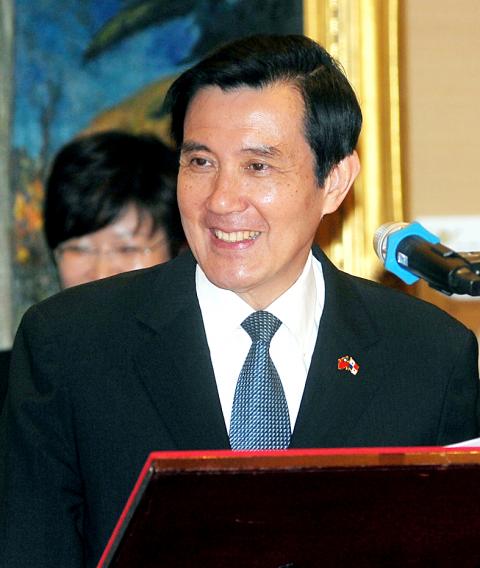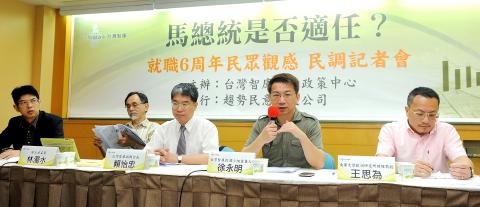President Ma Ying-jeou’s (馬英九) approval rating has fallen by more than half since he assumed office in 2008, according to a survey released by Taiwan Indicators Survey Research (TISR) yesterday ahead of the sixth anniversary of his presidency on Tuesday next week.
The survey showed Ma’s latest approval rating at 17.9 percent, down 19.9 percentage points from June 2008, a month after he was sworn in for his first term, while his disapproval rating increased by more than 1.5 times from 46.2 to 71.1 percent over the same period.
The number of those polled who deem the president untrustworthy has also risen since Ma was first elected, climbing from 55.4 percent in June 2008 to 62.2 percent.

Photo: CNA
On a scale of 1 to 100, respondents in TISR’s poll gave Ma a failing grade of 44.3 points for his performance as head of state over the past six years. A further breakdown of the results shows that even those who identified themselves as supporters of the Chinese Nationalist Party (KMT) that Ma heads as chairman “flunked” the president, giving him an average score of 59.7.
The survey participants who said they are pan-green supporters or swing voters scored Ma’s performance at 32.8 and 41.1 points respectively, the results show.
Respondents’ dissatisfaction was not confined to Ma, with most Cabinet members also failing to impress the majority of those polled.

Photo: Wang Min-wei, Taipei Times
As many as 76 percent of participants ranked Atomic Energy Council Minister Tsai Chuen-horng’s (蔡春鴻) achievements in office as the least remarkable, followed by those of Council of Agriculture Minister Chen Bao-ji (陳保基) at 72.1 percent and of Minister of the Interior Chen Wei-zen (陳威仁) at 69.6 percent.
Only two of the Cabinet’s 12 members had approval ratings above 20 percent: Minister of Culture Lung Ying-tai (龍應台) (24.6 percent) and Minister of Justice Luo Ying-shay (羅瑩雪) (21.2 percent).
Respondents said they are most unsatisfied with the work of Minister of Transportation and Communications Yeh Kuang-shih (葉匡時) and Minister of Economic Affairs Chang Chia-juch (張家祝), who were given the highest disapproval ratings at 35.8 and 35 percent respectively.
The survey was conducted from Wednesday to Friday last week through a random telephone sampling of 1,001 people aged 20 and older. It has a confidence level of 95 percent and a margin of error of 3.1 percentage points.
A separate survey conducted by Taiwan Thinktank put Ma’s approval rating at nearly the same level as TISR’s poll on 17.4 percent and yielded a slightly higher disapproval rating of 72.8 percent.
As many as 64.8 percent of respondents in the think tank’s poll said Ma had not done a good job, Taiwan Thinktank deputy executive Lai I-chung (賴怡忠) told a press conference yesterday.
Soochow University professor Hsu Yung-ming (徐永明) said the think tank poll shows Ma’s integrity is being questioned by the public, as 69. 5 percent of respondents said the president would not protect Taiwanese interests in cross-strait talks.
Meanwhile, 53.8 percent of those polled by the think tank said they trusted former Democratic Progressive Party (DPP) chairperson Tsai Ing-wen (蔡英文), Hsu added.
Asked if the DPP could gain ground in the seven-in-one elections in November, former DPP Legislator Lin Cho-shui (林濁水) said Ma’s incompetence would hurt the KMT’s showing in the electoral contests.
The Taiwan Thinktank poll was conducted from April 26 to April 28, taking 1,230 samples with a margin of error of 2.8 percentage points.

CHAOS: Iranians took to the streets playing celebratory music after reports of Khamenei’s death on Saturday, while mourners also gathered in Tehran yesterday Iranian Supreme Leader Ayatollah Ali Khamenei was killed in a major attack on Iran launched by Israel and the US, throwing the future of the Islamic republic into doubt and raising the risk of regional instability. Iranian state television and the state-run IRNA news agency announced the 86-year-old’s death early yesterday. US President Donald Trump said it gave Iranians their “greatest chance” to “take back” their country. The announcements came after a joint US and Israeli aerial bombardment that targeted Iranian military and governmental sites. Trump said the “heavy and pinpoint bombing” would continue through the week or as long

TRUST: The KMT said it respected the US’ timing and considerations, and hoped it would continue to honor its commitments to helping Taiwan bolster its defenses and deterrence US President Donald Trump is delaying a multibillion-dollar arms sale to Taiwan to ensure his visit to Beijing is successful, a New York Times report said. The weapons sales package has stalled in the US Department of State, the report said, citing US officials it did not identify. The White House has told agencies not to push forward ahead of Trump’s meeting with Chinese President Xi Jinping (習近平), it said. The two last month held a phone call to discuss trade and geopolitical flashpoints ahead of the summit. Xi raised the Taiwan issue and urged the US to handle arms sales to

State-run CPC Corp, Taiwan (CPC, 台灣中油) yesterday said that it had confirmed on Saturday night with its liquefied natural gas (LNG) and crude oil suppliers that shipments are proceeding as scheduled and that domestic supplies remain unaffected. The CPC yesterday announced the gasoline and diesel prices will rise by NT$0.2 and NT$0.4 per liter, respectively, starting Monday, citing Middle East tensions and blizzards in the eastern United States. CPC also iterated it has been reducing the proportion of crude oil imports from the Middle East and diversifying its supply sources in the past few years in response to geopolitical risks, expanding

An Emirates flight from Dubai arrived at Taiwan Taoyuan International Airport yesterday afternoon, the first service of the airline since the US and Israel launched strikes against Iran on Saturday. Flight EK366 took off from the United Arab Emirates (UAE) at 3:51am yesterday and landed at 4:02pm before taxiing to the airport’s D6 gate at Terminal 2 at 4:08pm, data from the airport and FlightAware, a global flight tracking site, showed. Of the 501 passengers on the flight, 275 were Taiwanese, including 96 group tour travelers, the data showed. Tourism Administration Deputy Director-General Huang He-ting (黃荷婷) greeted Taiwanese passengers at the airport and